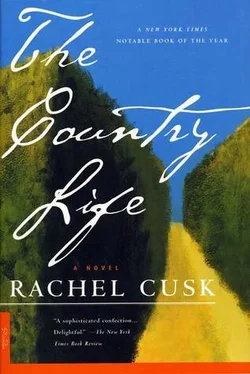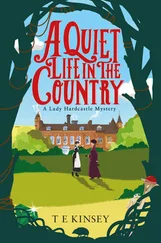‘My—’ Through the crack of my eyelid I saw Martin’s mouth, flapping like an open door in the wind. I guessed that he had been about to tell me that his ancestors were in the Domesday Book. ‘Bearskins were earlier,’ he said finally. ‘Don’t you know anything?’
I sat up again and opened my eyes. I knew that I had to get out of the sun immediately. My sunburn was proving to be very inconvenient, a form of incontinence. I glimpsed a wedge of shadow on the sundial in front of me, and for no reason other than idle curiosity peered at it more closely. There were numbers engraved all around its circumference, and the shadow fell exactly between a twelve and a one. It then dawned on me that this was the time. I was about to remark on what a clever thing the sundial was when I thought that Martin might laugh at me for it, my logic having a backward flavour.
‘Goodness, look at the time!’ I exclaimed instead. ‘We’d better be getting back.’
‘Do we have to?’ complained Martin. ‘I was having fun.’
‘I’ll take that as a compliment,’ I replied, getting to my feet. My head swam for an instant. ‘Personally, I always prefer to quit while I’m ahead. How do we get back to the house?’
I grasped the handles of Martin’s chair and wheeled it around on its axis. Much as I pitied him for having to submit, physically at least, to my authority, there were advantages to having him chair-bound. I imagined running around the rose garden trying to catch him as he scampered off on his little legs, and almost laughed aloud. I had certainly been in the sun for far too long.
‘That way,’ said Martin, pointing directly ahead.
We set off in the opposite direction to that from which we had entered the rose garden and before long came to a gate identical to the first. I tried to work out where this would lead us, and figured that it would be somewhere to the side of the house. Martin leaned forward and opened the latch; and when I propelled him through I was surprised to see that we had entered directly what was evidently the bottom of the back garden. Turning around, I realized that the side wall of the rose garden was also the side boundary of the back garden. To our left was a queue of trees, evergreens, so dense that it was difficult to see what lay beyond them. In front and to our right was a great lawn, at the top of which was the back of the house.
‘Come on,’ said Martin, jiggling up and down as if he were spurring on a horse.
I braced my back and began to push.
The back of the house was quite different from the front; although like a revolving door, some frustration in its design made it impossible to get a sense of both sides at once. Indeed, for some time as we made our slow progress up the lawn I was unable to articulate what constituted this difference, great though it was. The rear of the house seemed far older and more frail, and gave the impression of being ignorant of the monolithic grandeur of its façade, like a rich old aunt tucked out of view. It had a number of flowering vines and other greenery creeping up its walls in patterns of invasion, giving it that sprawling, colonized look which constitutes rusticity: an air of monitored decomposition, as if the house were being held on the brink of an elegant faint before it sank into the garden’s arms. At the very centre of the back wall was a glass appendage, like a prosthetic ear, in the shape of a beehive; a conservatory, I soon realized, within which I could discern a muffled profusion of fronds.
The garden which surrounded this fragrant heap consisted mostly of a large expanse of lawn, although to one side I could see the municipal architecture of the swimming pool, its undisturbed, unnatural blue lying flat on the grass like a fallen piece of sky. The lawn itself curiously sported a pattern of stripes — a piece of horticultural frivolity, I guessed, related to the cutting of hedges into the shapes of chickens or dogs — which rolled out towards us in a fan from the distant point of the conservatory. At the far end of the lawn was an arrangement of tables and chairs, upon one of which I could just make out the familiar form of Pamela. On another of the chairs sat a woman I did not recognize. From that distance the scene appeared very small, and the oppressive heat gave it an atmosphere of calcification which reminded me of the little plaster figurines which had populated my doll’s house when I was a child. It was odd and not entirely pleasant to remember this object, having not thought about it for years. The feeling that one’s own memories have become unfamiliar can give rise to the suspicion that one’s identity is malfunctioning and inefficient, like a badly run office. I had a sudden picture of pink plaster hams, and tiny plates to which coloured food was glued. Mr Madden appeared from the side of the house, as elliptical as a butler. Roy trotted heavily behind him. He was carrying a tray and when he reached the table he bent stiffly with it from the waist, distributing glasses which winked in the sunlight.
‘Look who’s here,’ said Martin from below. I was surprised to hear his voice, for although I had been pushing him along all of this time, I had grown so used to the action that the wheelchair, and to some degree Martin’s presence, seemed to have become a part of my own physical remit.
‘Who?’ I said, my voice lower than his, for we were now within fifty yards or so of the group.
‘My fucking sister,’ Martin volubly replied. ‘Come to see her mummy. Can’t keep her away.’
‘Does she live far?’ I enquired, toiling up a slight rise in the lawn.
‘Just a stone’s throw,’ said Martin in a fluting voice. ‘She wanted to stay near her mummy. I had hoped Dewek would take her away to Papua New Guinea so that they’d both be eaten by savages. Or at least as far as Tonbridge.’
‘Who’s Derek?’
‘Dewek,’ amended Martin. ‘Dewek is Caroline’s damp face flannel of a husband.’
‘There’s no need to be unkind,’ I said.
‘What do you know, anyway?’ said Martin, drumming his hands abstractedly on the arms of his chair. ‘Stel-la.’
Pamela had caught us in her sights and raised her hand in a salute of acknowledgement, using the other hand to shield her eyes, as if we were travellers sighted across a lonely reach of desert.
‘Hi-i!’ she called from afar, stretching the word in her customary fashion, her face split by a smile.
‘Hi!’ I called back.
Pamela was wearing a pea-green bikini and a pair of gold sandals. Around her neck glittered a thick gold chain, like a rope. The effect, as she sat glass in hand, was odd, as if she were at a party but had forgetfully come out in her underwear. The other woman — Martin’s sister, as I now knew, although she did not resemble him at all — was wearing a dress patterned with vivid tropical flowers. She was fairly plump, not in the dense, landscaped fashion of Mrs Barker, but rather as if she had been filled too full and had spilled over. She had straight fair hair cut in a kind of thatch above her forehead, the colour, if nothing else about her appearance, favouring Pamela. She watched our approach closely through dark glasses, like a secret agent. Even from a distance I took a more or less instant dislike to her. There was something despotic about her solid, suspicious face and bulk. I was beset by an image of her in army uniform, setting about some cringing cadet with a truncheon.
‘How did you get on?’ said Pamela, as we drew up to the table. The skin about her eyes looked very wrinkled in the sun, and her pupils glinted like tiny jewels kept in a crumpled handkerchief.
‘Fine,’ I said.
‘Mar-Mar?’ Pamela leaned forward slightly and concentrated her gaze on Martin. She was not, I decided, speaking in some alien dialect, but rather was deploying, or even inventing, a nickname. I was irritated by her concern, implying as it did a certain untrustworthiness or even outright menace on my part. ‘How about you?’
Читать дальше












